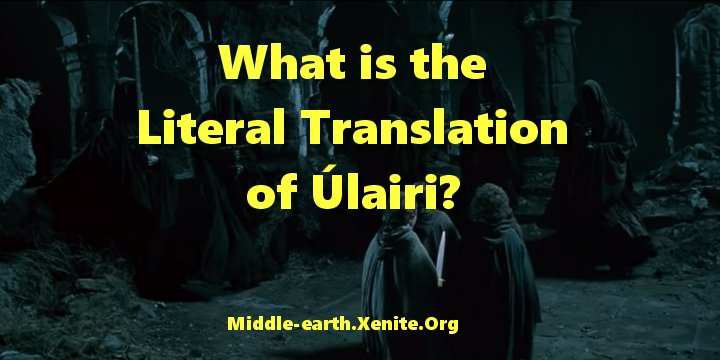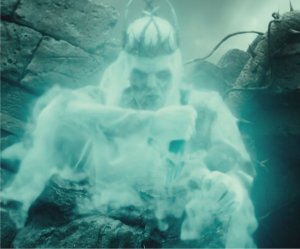
Q: What is the Literal Translation of Úlairi?
ANSWER: So far as I know, none of the well-known Tolkien linguists has proposed a formal translation for the word Úlairi, which J.R.R. Tolkien noted was a Quenya plural form for the collective name of the Ringwraiths (aka the Nazgûl). There is no in-story use of the term Úlairi of which I am aware. I would guess that Tolkien meant for the name to have been devised in the Second Age, when more speakers of Quenya were still living in Middle-earth and/or Númenor. Even though the language had by that time become a cherished “formal” language it may still have been used for communication between Valinor and people living in Númenor or Middle-earth.
Such an occasional use would certainly call for the construction of new words to explain things previously unencountered by the Noldor before they abandoned daily use of the Quenya language in Beleriand. Hence, when the Ringwraiths first appeared they may have been given a formal designation of Úlairi in annals and letters composed for archives and conveyance to overseas recipients. Quenya, after all, would still be spoken by the Noldor of Aman (although the Exiles of Tol Eressëa probably continued to use Sindarin, which would have served as a common tongue with the Númenoreans).

The etymology of the word does not seem to have sparked much notable discussion (although Google now makes it almost impossible to find legitimate Websites that have not been highly commercialized). Having little to no real knowledge of how Quenya works I have rarely dipped into the waters of Quenya etymology but this word won’t embarrass me any more than the few others I have tried to deconstruct.
Given the use of the prefix u- in Umaiar as an approximate equivalent to English un- (in the sense of “bad, immoral, evil”) I will start there. That leaves a root word lairi still in what I presume is plural form. According to Helge Fauskanger’s Quenya guide the suffix -ri could be the plural form of -r, -ro which he identifies as an “agentive ending” (“… pertaining to the semantic role or case of a noun phrase that indicates the volitional or primary causer of the action expressed by a verb” Cf. Reference.com). An alternative meaning from that definition page is given as “pertaining to, or productive of, a form that indicates an agent or agency.”
Frankly, I don’t think the Ringwraiths caused anything but their rings caused them to become wraiths. Did the Elves recognize this right away? I’m not so sure. After all, Helge identifies colma as “ring” (worn on finger). I just don’t see any connection between colma and Úlairi. Hence, I don’t think the word means anything like “caused by” or “derived from” or “agent of/via” a ring.
An older use of -ro was as a male suffix but I infer from Helge’s site that Tolkien may have abandoned such usage. So one question that comes to mind is when Tolkien devised the word. Still, given that it uses the unisex plural form -ri that may not matter. I think in this case -ri simply denotes a group of individuals, who may or may not be “agents” or representatives of something.
If that is the case then we are left with lai, which could be the Quenya word for “green”. Or it could a shortened form of laimë, which Helge’s site translates as “shadow”. Greenness might be associated with life or living things in some poetic uses but coite is the actual Quenya word for “living being” (adjectival coirea is translated into English “living”). The Quenya word for “greenness” is laiquassë but I cannot think of any poetic uses that attach “green, greenness” to life.
Cuilë is another word for “life, being alive”, which Tolkien most likely modeled on the earlier (Qenya?) coi, “life”.
-Lë is a suffix in Cuilë that seems to mean “come to be” (in other words, it is used to form nouns from verbs and adjectives, or maybe other nouns). So I don’t think we can argue for lë as a root of the word.
Thus, I would hazard the guess that Úlairi is a compound formed from Ú + lai + ri with probable meaning of “un (bad or immoral)” + “shadow” + “ones”. In other words, the name may mean something like “those who are in/of unnatural shadow”. This might refer to their ability to become invisible but I doubt it. Rather, given how much Tolkien uses the word shadow to refer to the evilness of the world (and the Dark Lords Morgoth and Sauron) I think Úlairi probably denotes a group of especially evil people, recognized for their distinctive qualities (powers) without any actual knowledge of where those powers came from. Such knowledge might have been discerned much, much later.
If my guess is correct then perhaps the name is meant to imply that the Úlairi of the Second Age were so evil that they exceeded the bad behavior of nearly all other creatures besides Sauron. They were acknowledged as having never been encountered before simply because their name does not associate them with anything else in the lexicon. The name may even imply that the Úlairi were the sources of great evil and suffering, miniature dark lords in their own rights, but not rivals to Sauron.
If so (and now we are into the realm of speculating on the basis of speculation) then perhaps Tolkien is implying that Sauron didn’t just seek out ambitious men to make his slaves. Maybe Tolkien is implying that Sauron sought out particularly evil men who had lost their moral foundations; that could explain how the Ringwraiths appeared so quickly after Sauron took the Nine away from the Elves. He didn’t have to wait long for them to fade.
See also:
- What is the History of the Nazgûl?
- How Sauron able to Trap the Nazgûl in Middle-earth?
- Shhh! It’s a Secret Ring!
# # #
Have you read our other Tolkien and Middle-earth Questions and Answers articles?

Nazgul are special I guess deserving a new name. Well but supposedly there were other, let’s say…generic wraiths, right? So is there a Quenya name for such ‘undead’ things (I know nothing about Quenya vocabulary 🙂 ), supposedly necromancy was already known in times of Morgoth (and possibly those who practiced the black arts, sorcery and necromancy, not only of Maiar origin), so maybe such things like Wights too could exist earlier and proper name would be invented for them. Do you know something about it? I’m interested, while we don’t hear about undead Wights in armies of Morgoth there probably was something like it nonetheless (often there is reference to evil sprits though, so all kinds of wraiths or wights might be a possibil, not all of those wee Umaiar, there were supposedly souls of sentients enslaved by dark power of Morgoth and if orcs have souls after dying they could be errr recycled to make new dark creatures hehe).
Darrell wrote in with the following comment:
In your Q&A piece on the name Úlairi (August 15, 2014), you seem to be overthinking the construction of the name. The element lairi is the plural form of lairë “summer(time)”, thus the Úlairi are the “un-summers” — at least, that’s how I’ve always understood it. I’m not able to check right now, but I thought this translation had been given somewhere in the published books. I could be remembering wrong. Still, it seems like a plausible translation, since the Elves seem to be generally fond of summer and warmth and light, and the Nazgûl could certainly be seen as embodying an absence (or even a denial) of those things. (I’ll understand if you disagree, but at least now you’ve had a chance to consider the idea.)